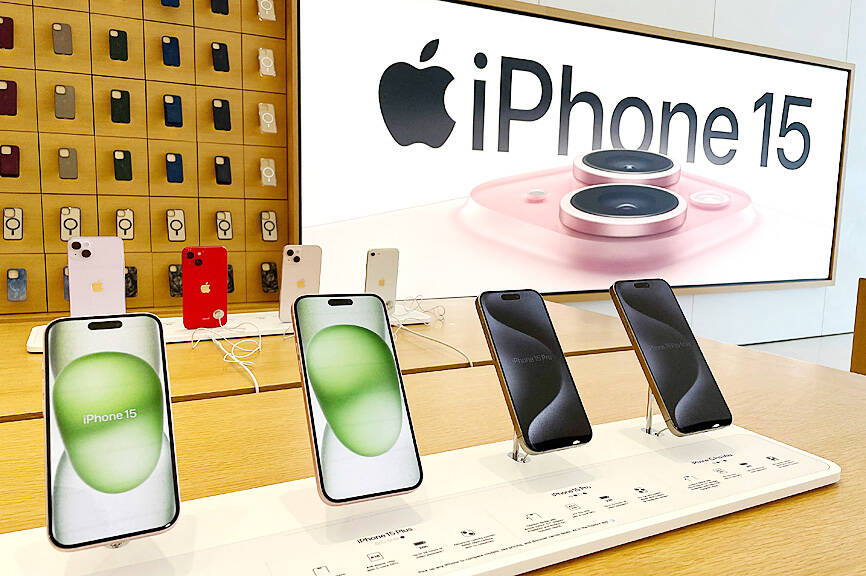Apple Inc’s disappointing holiday-quarter outlook has cast a spotlight on its mounting problems in China, where the iPhone maker is struggling with the unexpected rise of Huawei Technologies Co (華為) and an increasingly hostile business environment.
Apple, which is trying to reverse several successive quarters of revenue decline, on Thursday reported its lowest revenue from the Greater China region since the middle of last year.
Revenue fell to US$89.5 billion in the fiscal fourth quarter, which ended on Sept. 30. That compared to an average Wall Street estimate of US$89.4 billion. Apple’s shares slid more than 3 percent after that number missed the average of five analysts’ projections by 11 percent.

Photo: AFP
Apple CEO Tim Cook assured Wall Street that iPhone demand remains strong in China, blaming Mac and iPad weakness instead.
However, he also predicted flat December-quarter revenue, dampening analysts’ expectations of a growth rebound.
“The challenges that Apple faces in China are unprecedented,” International Data Corp analyst Will Wong said. “It not only needs to deal with the political tensions and Huawei’s competition, but also a different consumer sentiment that is more rational and cautious in spending.”
Apple’s revenue in Greater China declined 2 percent — a steeper drop than the companywide figure. There are signs that the trend might persist: Initial sales of the iPhone 15 in China were 6 percent lower than its predecessor in part because of incursions by Huawei, the consultancy GfK said.
Aside from stronger competition, Apple faces growing risk from political tensions between Washington and Beijing.
Beijing has expanded a ban on Apple products to state-backed firms and government-backed agencies. Hon Hai Precision Industry Co (鴻海精密) — which assembles the majority of Apple’s iPhones from its Chinese factories — is now under investigation over taxes and land use.
Shares of Hon Hai, also known as Foxconn Technology Group (富士康科技集團), and fellow iPhone assembler Pegatron Corp (和碩) fell 1.24 percent and 0.65 percent respectively yesterday.
Still, the iPhone continues to make inroads in the world’s biggest smartphone market, Cook said.
Various models accounted for the four top-selling phones in urban China, he said.
“China is an incredibly important market,” he said during a post-earnings conference call with analysts. “And I’m very optimistic about it.”
He did not face any direct questions about the situation.
If the overall Chinese smartphone market is contracting — as analysts have said — Apple’s results suggest that it is winning market share, Cook said.
He also touted that the company is opening a new store in the country this week. It is coming to Wenzhou in eastern Zhejiang Province and will be the company’s 46th in the region.

Taiwan Semiconductor Manufacturing Co (TSMC, 台積電) would not produce its most advanced technologies in the US next year, Minister of Economic Affairs J.W. Kuo (郭智輝) said yesterday. Kuo made the comment during an appearance at the legislature, hours after the chipmaker announced that it would invest an additional US$100 billion to expand its manufacturing operations in the US. Asked by Taiwan People’s Party Legislator-at-large Chang Chi-kai (張啟楷) if TSMC would allow its most advanced technologies, the yet-to-be-released 2-nanometer and 1.6-nanometer processes, to go to the US in the near term, Kuo denied it. TSMC recently opened its first US factory, which produces 4-nanometer

GREAT SUCCESS: Republican Senator Todd Young expressed surprise at Trump’s comments and said he expects the administration to keep the program running US lawmakers who helped secure billions of dollars in subsidies for domestic semiconductor manufacturing rejected US President Donald Trump’s call to revoke the 2022 CHIPS and Science Act, signaling that any repeal effort in the US Congress would fall short. US Senate Minority Leader Chuck Schumer, who negotiated the law, on Wednesday said that Trump’s demand would fail, while a top Republican proponent, US Senator Todd Young, expressed surprise at the president’s comments and said he expects the administration to keep the program running. The CHIPS Act is “essential for America leading the world in tech, leading the world in AI [artificial

REACTIONS: While most analysts were positive about TSMC’s investment, one said the US expansion could disrupt the company’s supply-demand balance Taiwan Semiconductor Manufacturing Co’s (TSMC, 台積電) new US$100 billion investment in the US would exert a positive effect on the chipmaker’s revenue in the medium term on the back of booming artificial intelligence (AI) chip demand from US chip designers, an International Data Corp (IDC) analyst said yesterday. “This is good for TSMC in terms of business expansion, as its major clients for advanced chips are US chip designers,” IDC senior semiconductor research manager Galen Zeng (曾冠瑋) said by telephone yesterday. “Besides, those US companies all consider supply chain resilience a business imperative,” Zeng said. That meant local supply would

Servers that might contain artificial intelligence (AI)-powering Nvidia Corp chips shipped from the US to Singapore ended up in Malaysia, but their actual final destination remains a mystery, Singaporean Minister for Home Affairs and Law K Shanmugam said yesterday. The US is cracking down on exports of advanced semiconductors to China, seeking to retain a competitive edge over the technology. However, Bloomberg News reported in late January that US officials were probing whether Chinese AI firm DeepSeek (深度求索) bought advanced Nvidia semiconductors through third parties in Singapore, skirting Washington’s restrictions. Shanmugam said the route of the chips emerged in the course of an